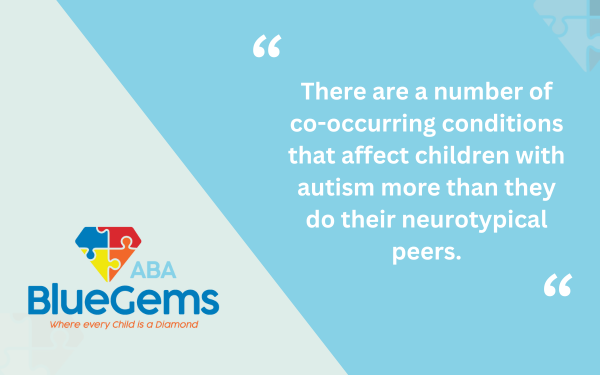Autism Comorbidities
Autism spectrum disorder (ASD) is a neurodevelopmental disorder that most commonly causes deficits in communication and social interactions. Children who have it also commonly have restrictive interests, exhibit repetitive behaviors and/or have sensory sensitivity issues.
In addition to these challenges, many children on the autism spectrum also suffer from comorbidities. In other words, suffer from various co-occuring mental health and/or physical conditions.
Some of these issues might also affect them throughout their lifetime, like autism does, or they could appear and then go away at different stages of their development.
It’s generally accepted in the medical community that the average lifespan of a person with ASD is much lower than that of neurotypical individuals. The reason for this, though, is likely due to their comorbidities and not autism itself.
Below, we’ll discuss what some of the most common autism comorbidities are, the challenge in identifying them and what can be done to support children who have them.
Table Of Contents
What are Some of the Most Common Autism Comorbidities?
As mentioned, there are a number of co-occurring conditions that affect children with autism more than they do their neurotypical peers. Some of these are purely physical in nature, while others are related to mental health.

Epilepsy, for example, is estimated to affect as much as 40% of all people with autism, compared to only about 3% of the entire population. Associated with seizures that sometimes come out of the blue, epilepsy can be very dangerous to people who have it.
Other studies have shown that 85% of people with autism also suffer from at least one gastrointestinal disorder. Much of this could be due to children with autism having aversions to certain types of foods, preferring only highly processed foods and not eating a variety of foods.
Chronic sleep issues also affect people with ASD at high rates. As many as 80% of all children on the autism spectrum are affected by a sleep problem, including troubling falling asleep or staying asleep, waking up very early or more serious issues such as sleep apnea.
Mental health issues are a big concern for people who have autism. Research has suggested that as much as 85% of all children who have autism suffer from at least one psychiatric issue, with anxiety, depression and ADHD being the most common.
Why is It Challenging to Identify Autism Comorbidities?
Parents and caregivers of children with autism, as well as their pediatricians and other support professionals, often face challenges identifying some of these comorbidities. A main reason for this is the simple fact that these children aren’t as easily able to recognize their symptoms and then effectively communicate them to someone who could help.

Remember that trouble communicating is a hallmark of autism. That doesn’t mean that they don’t or won’t try to communicate that they aren’t feeling well or are experiencing something; it’s just that they might not do it, or be able to do it, using their words.
When children on the autism spectrum are experiencing some of the telltale signs of a physical or mental health issue — such as feeling physical and/or emotional discomfort — they may begin to act out. They may become aggressive, irritable and/or display challenging behaviors.
They might begin to hurt themselves or exhibit other self-stimulatory behaviors that are ways in which they’re trying to calm themselves down. These are all potential signs that something else might be wrong.
Unfortunately, these signs can also just be symptoms of their autism itself. Being able to decipher between the two takes a trained eye and someone who has a lot of experience with that individual child.
How are Autism Comorbidities Treated?
Autism comorbidities are treated in many different ways. In reality, the specific treatment plan depends on the comorbidity.
Some of the comorbidities might be treated with prescribed medication. There are seizure and psychiatric medications that can be helpful for children with epilepsy and mental health issues, respectively.
Sleep disorders could be treated by practicing good sleep hygiene — such as establishing a good bedtime routine and creating a calming sleep environment — or with physical apparatus such as a CPAP machine for children with sleep apnea.
The gold standard of treatment plans for ASD specifically is applied behavior analysis, or ABA therapy. The science- and evidence-based approach to learning and behavior helps children with autism build the social and communication skills and also modify certain harmful behaviors.
In many ways, the strategies that therapists follow and the treatment plans they administer also help to treat and support many of the autism comorbidities. While ABA therapy can’t cure these comorbidities — or autism, for that matter — it can help children with ASD better identify, understand and communicate their symptoms, while also providing them with better ways to manage their resulting behaviors.
Blue Gems ABA Provides All-Around Support for Children with ASD
People with ASD often suffer from comorbidities. This provides additional challenges to the ones they already face due to their autism, and it puts extra pressure on parents, family members, caregivers and professional teams to do all they can to help support them.
At Blue Gems ABA, we are dedicated to providing all-around support for children with ASD. We specialize in administering ABA therapy to children on a one-to-one basis, which helps them live more happy, healthy and independent lives. We also work hand-in-hand with other members of your child’s familial and professional support team to serve them in the best ways we can.
To learn more, please contact us today.




